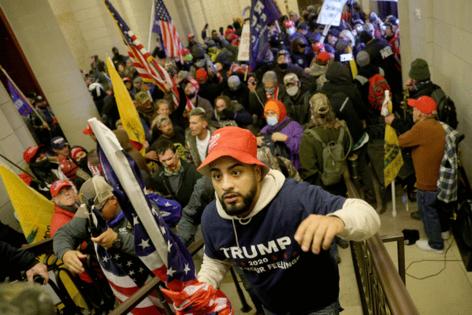Editorial: The president's pardon power needs reining in
Published in Op Eds
The recent presidential pardons of figures who tried to overturn the 2020 election are part of a broader effort to rewrite one of the most sordid episodes in recent memory. The effort should be rejected, and the pardon power — abused by presidents of both parties for far too long — needs to be reined in.
Earlier this month, the president pardoned nearly 80 staffers, lawyers, officials, operatives and other allies who attempted to accomplish through artifice what the Jan. 6 rioters tried to do by force: reverse the voters’ verdict. Their collective effort to ignore the election results and adopt slates of fake electors was an affront to American democracy.
The scheme collapsed thanks to Vice President Mike Pence, who honored his oath to the Constitution rather than participate in the brazen power grab. Ever since, the president and his closest allies haven’t stopped trying to repackage the perfidy as patriotism.
On his first day back in the White House, the president pardoned hundreds of people charged with and convicted of crimes related to the storming of the Capitol. Many of them had pleaded guilty to assaulting police officers. One has since been rearrested after threatening to kill House Minority Leader Hakeem Jeffries.
Even though the president previewed his actions during his 2024 campaign, many Republicans failed to take him seriously, including his running mate. “If you committed violence on that day,” Vice President-elect JD Vance declared in January, “obviously you shouldn’t be pardoned.” Obviously.
Although the latest round of pardons surprised no one, and some recipients may still face state-level criminal charges, it’s no less dangerous. It sends the message that breaking the law is acceptable when it serves the president’s interests. And it’s only one part of a broader effort to rewrite the history of the 2020 election. The Department of Justice has fired prosecutors who handled Jan. 6 cases and placed on leave those who referred to a “mob of rioters” in a sentencing memo. Meanwhile, House Republicans recently established a committee to reinvestigate the events of that day, forcing taxpayers to fund an apparent effort at whitewashing the riot and its causes.
Unfortunately, abuses of the pardon power haven’t been confined to the 2020 election. The president has pardoned others convicted of fraud, bribery, tax evasion, drug trafficking, insider trading and other crimes. Many of them have something in common: They’ve paid tribute to the president in one currency or another.
In one case, a pardon was issued after a $1 million super PAC donation. In another, clemency followed nearly $1.7 million in campaign support. And in the most staggering case, a pardon arrived after a $2 billion crypto investment in a company founded by the president’s sons. Even by the low standards of past presidents — Democrats, including former President Joe Biden, have also abused the power — this spree appears to be egregiously self-serving.
Although the president’s pardon power is enshrined in the Constitution, Congress should move to circumscribe it around a few basic principles: No pardons should be permitted in exchange for anything of value. Self-pardons should be barred. And pardons issued in conjunction with a case involving presidents or their family members should trigger the release of all relevant investigative materials to Congress, to ensure greater public transparency.
Such provisions will surely invite legal challenges. But even the president’s strongest supporters would be hard-pressed to oppose them on the merits. More to the point: Doing nothing would be unpardonable.
____
The Editorial Board publishes the views of the editors across a range of national and global affairs.
©2025 Bloomberg L.P. Visit bloomberg.com/opinion. Distributed by Tribune Content Agency, LLC.
























































Comments